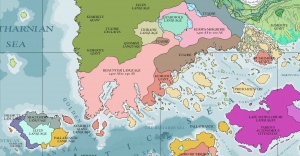Difference between revisions of "Kerspa-Kvé Language"
Trismegistus (talk | contribs) (Created page with "thumb|300px|Map showing the likely dispersion of ancient Languages throughout southwestern [[Pytharnia around 1000 AS.]] Kerspa-K...") |
Trismegistus (talk | contribs) m |
||
| Line 5: | Line 5: | ||
=Diachronic Flow= | =Diachronic Flow= | ||
| − | Paleo-Gwenyan → Ancient High Gwenyan → Early Erserce-Pallathantic → Donavish → Proto-Moigthe → Common Moigthe → '''Kerspa- | + | Paleo-Gwenyan → Ancient High Gwenyan → Early Erserce-Pallathantic → Donavish → Proto-Moigthe → Common Moigthe → '''Kerspa-Kvé''' → x |
=See Also= | =See Also= | ||
Latest revision as of 13:02, 1 December 2019
Kerspa-Kvé in the scholarly name for the East Moigthe language which is part of the Donavish branch of Ancient High Gwenyan. The name means 'Herald Speech' as it was considered the high version of the language, suitable for recitation of the works of Luvasirgwer. It was a preliterate language spoken over a roughly 1300 years, from about 1400 AS to 100 AS. It is the parent language of the Moigthe languages of High Pytharnia and by descendancy of Dúrandwor. Kerspa-Moighdhe is remembered through divination, stone inscriptions, and a few texts transcribed by Jathya-Dhumi scholars, notably of Luvasirgwer. It is sometimes called Kerspa-Moigdhe or East Moigthe.
Diachronic Flow
Paleo-Gwenyan → Ancient High Gwenyan → Early Erserce-Pallathantic → Donavish → Proto-Moigthe → Common Moigthe → Kerspa-Kvé → x
See Also
- Donavish Languages
- Durrhaunve
- Erechórebese Language
- Gwenyan Languages
- Luvasirgwer
- Moigthe Languages
- Rhaunve River
- Rhaunvish Language, also known as East Moigthe, 1400 AS to 250 AS
| This article is a stub. It requires further development by the creator. |
